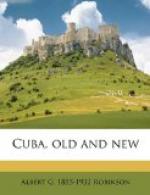For the first five months, the insurgents kept their opponents busy with an almost uninterrupted series of little engagements, a guerrilla warfare. In one of these, on May 19, Jose Marti was killed. His death was a severe blow to the patriots, but it served rather to inspire a greater activity than to check the movement. His death came in the effort of a small band of insurgents to pass the Spanish cordon designed to confine activities to Oriente Province. Immediately after the death of Marti, Maximo Gomez crossed that barrier and organized an army in Camaguey. The first engagement properly to be regarded as a battle occurred at Peralejo, near Bayamo, in Oriente, about the middle of July. The respective leaders were Antonio Maceo and General Martinez Campos, in person. The victory fell to Maceo, and Martinez Campos barely eluded capture. The engagements of the Ten Years’ War were confined to the then sparsely settled eastern half of the island. Those of the revolution of 1895 covered the greater part of the island, sweeping gradually but steadily from east to west. During my first visit to Cuba, I was frequently puzzled by references to “the invasion.” “What invasion?” I asked, “Who invaded the country?” I found that it meant the westward sweep of the liberating army under Gomez and Maceo. It covered a period of more than two years of frequent fighting and general destruction of property. Early in the operations Gomez issued the following proclamation:
GENERAL HEADQUARTERS OF THE ARMY OF LIBERATION
Najasa, Camaguey, July 1, 1895.
To THE PLANTERS AND OWNERS OF CATTLE RANCHES:
In accord with the great interests of the revolution for the independence of the country, and for which we are in arms:
WHEREAS, all exploitations of any product whatsoever are aids and resources to the Government that we are fighting, it is resolved by the general-in-chief to issue this general order throughout the island, that the introduction of articles of commerce, as well as beef and cattle, into the towns occupied by the enemy, is absolutely prohibited. The sugar plantations will stop their labors, and those who shall attempt to grind the crop notwithstanding this order, will have their cane burned and their buildings demolished. The person who, disobeying this order, shall try to profit from the present situation of affairs, will show by his conduct little respect for the rights of the revolution of redemption, and therefore shall be considered as an enemy, treated as a traitor, and tried as such in case of his capture.
(Signed) MAXIMO GOMEZ,
The General-in-Chief.
This proved only partially effective, and it was followed by a circular to commanding officers, a few months later, reading thus:




